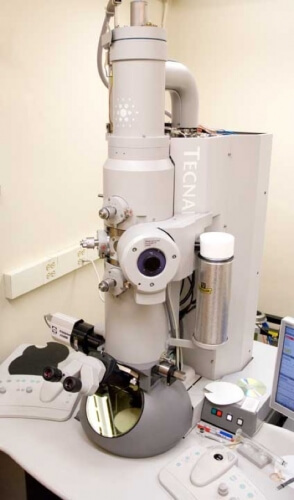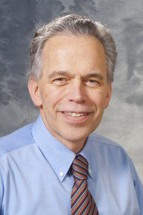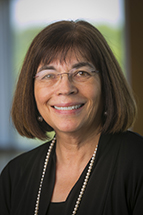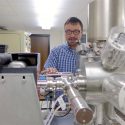Working group recommends coordination of campus research cores
A working group that studied campuswide research core resources, chaired by School of Medicine and Public Health Senior Associate Dean for Basic Research, Biotechnology and Graduate Studies Rick Moss, has recommended that an Office of Campus Research Cores be created to coordinate research core resources at UW–Madison.
Marsha Mailick, the vice chancellor for research and graduate education, appointed the Working Group on Scientific Core Resources a little more than a year ago. The group issued a final report this past summer. Mailick and her office have been reviewing the report with campus leaders and governance groups. Based on strong campus support, they are beginning to implement a number of the group’s recommendations.

A transmission electron microscope at the College of Engineering’s Materials Science Center, one of campus’s core research sites.
The first order of business, she says, will be to select a director of the Office of Campus Research Cores. A search to fill the position will begin this week.
“We will be looking for a dynamic leader to oversee this important new unit, which will coordinate our campus core resources and strengthen our position as a world-class research university,” Mailick says. “This initiative will not reduce the autonomy of individual cores but rather help improve access to research cores and the effectiveness and efficiency of campus research resources.”
Research cores are centralized, shared research resources that provide access to instruments, technologies, services, as well as expert consultation and other services to scientific and clinical investigators.
There is no comprehensive campus core resource inventory, the working group found. The group, therefore, recommended the creation of a searchable online portal for internal users and core directors with a list of all campus core facilities, access to pricing and policies, and online calendars.
The group proposed methods for coordination of core facilities and services across campus.
“Implementation of these methods should contribute to a supportive, sustainable environment for research at UW–Madison,” the group says in its report.
Among the recommendations Mailick will move forward on is the formation of a Campus Core Advisory Committee, which will provide advice on how best to coordinate and optimize research core resources.
The establishment of an Office of Campus Research Cores will bring UW–Madison in line with other large research universities, including Cornell, the University of Chicago and the University of Michigan, each of which has a research cores office.
The working group, comprising faculty and staff representing multiple disciplines, including core directors and users, began its mission by distributing a survey to as many scientific cores as could be identified in order to better understand their operations and get a sense of the range of research cores across campus. Moss says he sees the benefits of establishing a research cores office.
“There are several potential benefits. The office and associated governance and business processes promise to optimize the cost of core services to users, ensure that core capacity is adequate for campus users, increase efficiency by reducing unnecessary redundancy in core capabilities across campus, ensure user access to cores, and facilitate sustainability of cores through business and operational planning,” Moss says.
He added praise for the group’s five months of work.
“The core working group was knowledgeable and enthusiastic about solutions to issues of governance, operations and business planning that were raised during the process,” Moss says. “The energy, expertise and dedication of the working group were truly remarkable.”
Mailick thanked the group for its hard work and a very thorough report.
“The group made important observations in its report about how to improve our current cores operations and structure, and we will work to begin to implement a number of their recommendations in the coming year. The group’s efforts are very highly appreciated,” she says.
Tags: research





